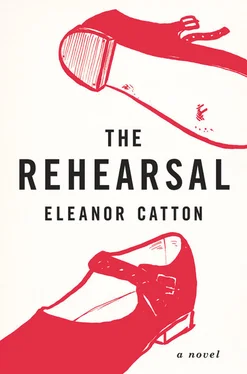Isolde is lost in this contemplation when Julia looks up and meets her gaze. It takes a moment for Isolde’s trance-glazed eyes to focus, and then she suffers a swoop in her gut, panicking for an instant in case the subject of her thoughts was in some way visible. Her heart begins to pound. Again Isolde thinks about the rumors that shadow Julia everywhere she goes, and suddenly she feels a little frightened, as if she has just made herself terribly vulnerable in a way she can’t quite understand. She panics and turns away. The counselor is talking again, and all around her the girls are nodding, full of contentment and pity and a deep satisfied peace.
Isolde’s heartbeat returns to normal. Julia’s words return to her in a late echo, washing over her with sudden volume like the unexpected slapping rush of a spring tide. I don’t agree, she said, that Mr. Saladin wanted to gain control. Isolde slithers down her seat in confusion and shame, and when the bell rings she slips out of the room without looking back.
Wednesday
“Bridget,” the saxophone teacher says, “I told you that if you didn’t play that bar perfectly first time I was going to scream.”
“I know,” says Bridget unhappily.
“Did you want me to scream? Did you imagine the sharp edge of each wrong note stuck like a little barb into the side of my face? Is that what you wanted?”
“No,” says Bridget.
The saxophone teacher draws out the silence between them for three minim rests, the metronome on the piano keeping dogged time. “Are you under pressure at home?” she asks. “Or at school?”
Bridget’s eyes fill with tears. “Did my mum call you?” she asks, dreading the inevitable. “She said she wouldn’t. She always says she won’t and then she does.”
The saxophone teacher looks her up and down, and then she asks, “Does your mother lie to you, Bridget?”
Bridget falls into miserable silence as she ponders the question.
Whenever she is bullied or short-changed or mistreated in any way, Bridget’s first panicked thought is always that she must make sure her mother doesn’t find out. Bridget’s mother marches into the school administration block almost fortnightly, complaining or querying or demanding on behalf of Bridget, always on behalf of Bridget, who trails in her mother’s righteous wake and once heard the secretary whisper, “That girl has got her mother wrapped around her little finger. Wrapped around.”
“Please don’t come in to school,” Bridget said in dread alarm last week, when her mother discovered she’d paid twice the cost of her sax rental for the month by mistake. “I’ll sort it out at jazz band. Please don’t come.”
“All right,” her mother said at last, peering at Bridget in a distrustful, grudging sort of way. “But make sure you get a receipt.” Later she doubled back on her way home from the supermarket and went in to the music department after all, before Bridget had a chance.
“I said I’d sort it out at jazz band,” Bridget said.
“Gave me a chance to ask what measures have been put in place,” Bridget’s mother said. She eased a puffy foot from her shoe and massaged it slowly. “After this whole Mr. Saladin ordeal, I said, I just want to know what measures have been put in place.” She peered at Bridget, brandishing her shoe in her fist. She said, “ Nothing , that’s what. Nothing is what’s been done.”
“I asked you not to go,” said Bridget quietly. “They think you’re wrapped around my finger.”
“Bridget,” said Bridget’s mother, “it’s my money you’re spending on that saxophone. I can manage my money as I please. Plus. It gave me a chance to stir them up a bit. Nothing is what’s been done.”
The saxophone teacher is waiting quietly for Bridget’s recollection to end.
“I suppose it is lying,” Bridget says at last. “I suppose she does lie to me.” The betrayal twists sourly in her stomach.
“It’s undermining,” the saxophone teacher says.
“I suppose so,” Bridget says. The metronome arm is still swinging back and forth, measuring the space between them.
The saxophone teacher lets Bridget’s misery weigh heavy for a moment, and then she says, “Your mum did come and see me last week, actually. Just to catch up. She’d had a run-in with one of the teachers at your school.”
Panic floods Bridget’s face. “What did she say?”
The sax teacher likes playing Bridget’s mother. She shrinks into herself until she looks pale and stringy and rumpled and slightly alarmed, toying with the end of her scarf in a mincing compulsive fashion, her little eyes darting to the edges of the room as she speaks.
“Bridget hasn’t had much luck with teachers,” is what Bridget’s mother said. “Teachers just don’t seem to click with her. It’s not that she’s a bad kid—she isn’t a troublemaker at all—and she’s not stupid. But there’s something about Bridget that seems to rub teachers up the wrong way. It seems that she’s just not a likeable girl. It’s not something I understand. How do you make your child likeable? I seem to have missed that opportunity. Somehow it passed me by.”
It is an accurate performance. The saxophone teacher returns to herself with a pleased expectant expression on her face, as if she knows that she qualifies for full marks but she wants to hear it confirmed all the same.
“She always says things like that,” Bridget says unhappily. “Talking about me like that. Going to see my teachers and telling them I have ideas, or asking them why I don’t have enough ideas and what they’re going to do about it.”
“It’s because she wants the best for you,” the saxophone teacher says.
“No, it isn’t,” Bridget says. “It’s because there’s nothing else happening in her life and she has to stick her nose in or she’d be bored out of her brain.”
“Come on, Bridget,” says the saxophone teacher in a scolding voice. “All that drama at your school—the sex scandal—it really shook her up. She’s worried about you.”
This sea change is characteristic of the saxophone teacher’s conversations with Bridget. A sudden about-face always provokes a satisfying wounded bewilderment that clouds Bridget’s face with shame and with the throbbing irreparable guilt of having said too much. The saxophone teacher watches the effect with satisfaction.
Bridget looks at her music miserably for a moment. Her pigtails are drooping and her ribbons are gray. “She said thank God you’re a woman,” she says suddenly, as if she is contemplating the words for the first time.
Thursday
The school that these girls so reluctantly attend is called Abbey Grange, colloquially known as either Scabby Grange or Abbey Grunge, depending on your mood or point of view. The boys from the high school opposite hang from their armpits along the iron fence and shout “Scabby Abbey!” through the bars, and when the girls take a shortcut through the St. Sylvester grounds they always shout out “Syphilis!” or “Saint Molester!” sometimes without an audience, but always with a judicious sense of evening the score.
Today Isolde is picking her way across the balding field toward Abbey Grange, threading a path around the wind-blown litter and the scuffed mud-holes crusted beige with last night’s ice. Steam rises from the netball courts as the sun warms the wet asphalt, and the patched netting behind the soccer goal is bright with dew. The painted divisions on the courts have faded from white to a dirty thready gray. The school is mostly weatherboard, cream and fawn, but there is a clump of newer buildings among the old, recently painted and brighter than the rest, standing out like shiny patches of skin over a new burn. All the trees are restrained with iron collars and ringed by chiseled seats that spell the name and fate of every student once imprisoned there.
Читать дальше












